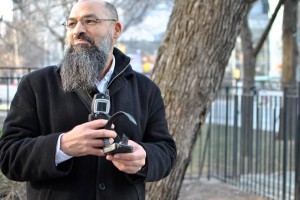
by Mat Nelson
An Egyptian refugee is hoping to raise awareness among Canadians about “security certificates,” a mechanism by which the government can arrest non-citizens without charge, detain them indefinitely, and eventually deport them — all on the basis of secret information.
At a Feb. 7 talk at Carleton University called “Mahjoub Speaks!: Twelve Years under Canada’s Security Certificate Regime,” Mohammad Zeki Mahjoub spoke at length of his devastating experiences under house arrest and in Canadian prisons.
“Any one of you could be in my position,” he said. “We have to investigate more, to find out what is going on in our country. The future of Canada is in your hands. Don’t underestimate yourself.”
Mahjoub was arrested in June 2000 under a security certificate after being labelled a national security threat by the Canadian Security Intelligence Service (CSIS). He spent a total of eight years in prison and nearly five years living under highly restrictive bail conditions, where he faced intrusive surveillance by CSIS agents and the Canada Border Services Agency (CBSA).
Forced to wear a GPS-tracking device, Mahjoub was denied access to the internet or cell phones, and barred from leaving his house without prior approval of the government. But on Feb. 1, a court order reduced his bail conditions, permitting him to cut off the tracking device and travel to Ottawa to share his experiences.
Mahjoub was accepted by Canada as a refugee in 1995 after fleeing persecution in Hosni Mubarak’s Egypt. The following year, CSIS became interested in him after exchanging intelligence with the Egyptian government. Mahjoub’s lawyers claimed this information was obtained through the use of torture.
When he was first arrested in 2000, Mahjoub said he was severely beaten by prison officials at the Toronto West Detention Centre. He also maintains that guards hurled racial slurs at him, performed invasive strip searches, and denied him proper medical attention, which resulted in a serious mouth infection and the loss of five teeth.
“I went through a lot of trouble, for nothing at all,” he said. “Just because I’m a Muslim.”
Mahjoub was later transferred to the Kingston Immigration Holding Centre, a federal prison for immigrants that was quietly shut down at the end of 2011. The facility was known by critics as “Guantanamo North,” a direct reference to the US-run Guantanamo Bay prison in Cuba where prisoners of the Iraq and Afghan wars were sent after the Sept. 11 attacks.
Mahjoub was placed in solitary confinement the day after 9/11 and staged the first of 12 debilitating hunger strikes, the longest of which lasted for 83 days.
For Mahjoub, there is no presumption of innocence in his case. “Every individual is innocent until proven guilty. But in my case, and in security certificate cases, it does not apply. Why? Because we didn’t commit a crime.”
Security certificate detainees are held because authorities believe they pose a “potential” threat to national security, according to section 77 of the Immigration and Refugee Protection Act. They need not have committed any crime. The government claims they are free to leave the country at any time, but Mahjoub and the other detainees face a substantial risk of torture and arbitrary imprisonment if they return to their countries of origin.
The RCMP would later admit in 2012 after his arrest that they had no evidence to charge Mahjoub with terrorism, or any other crime, in Canada. In 2005, CSIS also admitted in court that it had systematically destroyed evidence pertaining to security certificate cases and had violated solicitor-client privilege by illegally listening in on calls between Mahjoub and his attorneys. Meanwhile, an Egyptian military tribunal has since cleared his name, having ruled in 2012 that the evidence against Mahjoub was likely obtained through the use of torture.
“Charge me or release me,” he said. “It’s a very simple request. If I committed a crime, put me on trial, send me to jail, and nobody’s going to cry.”
However, Mahjoub’s troubles did not end with his house arrest. These conditions were “ten times worse” than detention, he said, “My whole family was jailed with me.”
Holding back tears, Mahjoub described his stepson’s breakdown and his oldest son’s attempted suicide. He eventually found the burden on his family to be unbearable, choosing instead to voluntarily return to prison for another year.
Despite his lengthy ordeal, Mahjoub is determined to see justice. “We have to speak out. We have to say, out loud, this is not justice.
Give this man a fair trial or release him. It’s a pretty simple demand. If there is justice, that is great, you will never hear my voice. But as long as there is no justice, I will speak out more and more and more.”
This article first appeared in the Leveller, Vol. 5, No. 5.







